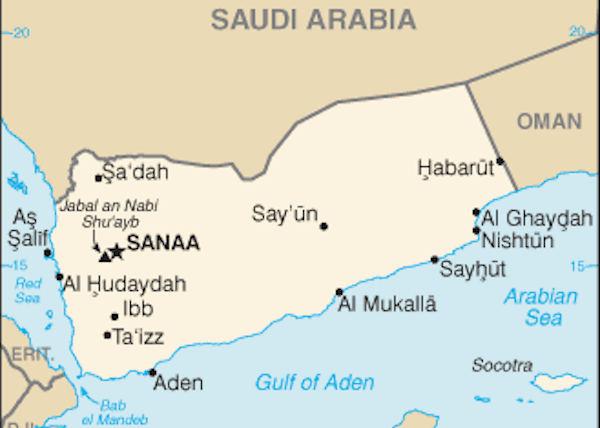After four months of nearly uninterrupted bombing by the Saudi air force and blockade by the Saudi navy, two articles (one big picture, one narrow but illustrative) sum up the horror that is the war in Yemen.

Washington Post: “In Yemen’s grinding war, if the bombs don’t get you, the water shortages will”
The number of Yemenis who lack access to drinking water has almost doubled since the war began, according to the United Nations and aid agencies. Now, they say, more than 20 million people — about 80 percent of Yemen’s population — struggle to find enough water to quench their thirst and bathe.
Diseases such as malaria are spreading, killing hundreds of people, because so many residents are forced to use improperly stored and unsanitary water, health experts say. The crisis is compounding a humanitarian emergency that already has prompted U.N. officials and aid workers to warn of famine.
[…]
Diesel fuel for backup generators, which could be used to power the pumps, has become scarce because of the difficulties of transporting it through war zones. In addition, U.N. officials and aid workers say an air and naval blockade established by the Saudi-led coalition is severely restricting imports.
[…]
The United Nations says that 120,000 children could die if the lack of access to clean water, sufficient food and adequate health care persists. The fighting has forced many hospitals and medical clinics to close.
The fighting from the Saudis and their allies on one side and the Houthis on the other side has killed an estimated 3,500 people in direct attacks. That will pale in comparison to the eventual death rate from the disease and starvation it is causing. Still, it is definitely not helping things to have Saudi bombers indiscriminately annihilating civilian targets constantly.
Associated Press: “Yemeni officials, witnesses: Saudi-led coalition airstrikes kill more than 120 in port city”
Saudi-led coalition airstrikes killed more than 120 civilians and wounded more than 150 after shelling a residential area [of Mokha] in the Yemeni province of Taiz on Friday evening, security officials, medical officials and witnesses said.
The officials, speaking on condition of anonymity because they were not authorized to speak to reporters, said that most of the houses in the area were leveled and a fire broke out in the port city of Mokha. Most of the corpses, including children, women and elderly people, were charred by the flames, they said.
They were trying to remove injured survivors out of the site on animal carts toward hospitals in the provincial capital, but those were inaccessible because the war has closed or blocked most roads. Saudi targeting of places in the middle of nowhere isn’t helping matters when it comes to saving the wounded:
Security officials said this comes after Saudi-led coalition planes launched dozens of airstrikes on positions of Shiite Houthi rebels and their allies in Mokha. The closest Houthi outpost to Friday evening’s deadly strike is at least 5km away, officials and area residents said.
These are our “allies.” We gave them those bombs and jets. They haven’t improved from bombing schools and refugee camps in April. At what point do we cut ties with them?
Militarily, it has taken the full four months to turn back the Houthis even a little bit (from the city of Aden). Their overall territorial hold remains larger than when the bombing began in March. So, the war hasn’t been strategically particularly effective either.
They are not destroying a rebellion. They are destroying Yemen. A country whose population is half children and which was already one of the poorest in the world.


